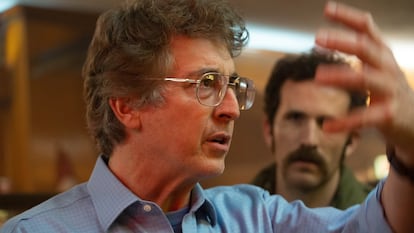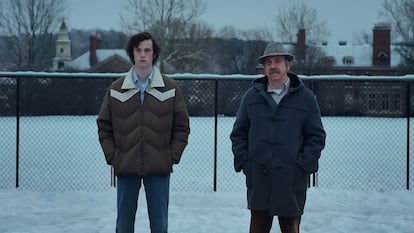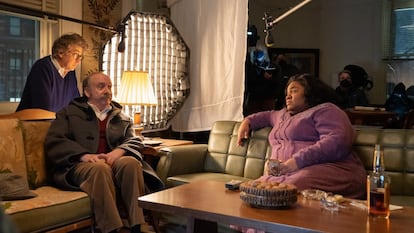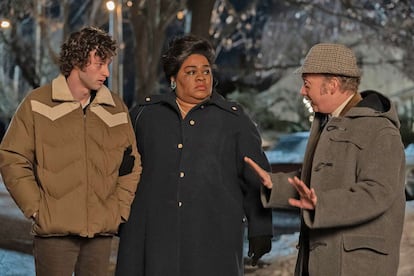Filmmaker Alexander Payne: ‘I’m not the only filmmaker who thinks about showing people before walking clichés’
His movie ‘The Holdovers’ demonstrates his passion for characters that reflect ordinary life. Last Sunday, the film won two Golden Globes


When he was a kid, Alexander Payne, now 62, dreamed of becoming a projectionist. “And look at me now,” he jokes by video call days before Christmas from his home in his native Omaha, Nebraska. The two-time Oscar winner for the screenplays of Sideways and The Descendants —and recipient of four other nominations, two in directing and two in screenwriting for Election and Nebraska — is one of those select filmmakers who can do whatever they want. “Well, I move in medium-sized budgets, I’m not very prolific.... That helps, but I wish I had been faster,” he confesses. “I respect good cinema too much to do anything. Although... there’s a certain pretentiousness in trying not to be pretentious. I plead guilty.”
The conversation comes amid Oscar buzz for his latest movie, The Holdovers, the story of three characters in the midst of life crises and find themselves alone and aimless one Christmas in the early 1970s at a New England boarding school: a teacher of ancient history, a wayward student and the cook, who has just lost her son in the Vietnam War. Two of the lead actors, Paul Giamatti, who plays the teacher, and who became famous two decades ago for Payne’s Sideways, and Da’Vine Joy Randolph, who plays the cook, won Golden Globes last Sunday. On January 23, when the Oscar nominations are announced, The Holdovers could be nominated in at least five categories. “One step at a time, please, one step at a time,” Payne says. On Wednesday, Payne was one of five directors nominated for the Directors Guild Awards.

Although he has only directed eight feature films, Payne often works simultaneously on various stages of his projects. The Holdovers grew out of a screening at the 2011 Telluride Film Festival, where Payne saw Marcel Pagnol’s 1935 classic Merlusse. “There’s the story of the professor with an eye problem. [Anyway,] it was the premise, not the seed. Because years later I got a script for a pilot episode from David Hemingson, who I didn’t know, that had a story similar to that one, and I called him up and challenged him, ‘What if you rewrote it as a movie?’ And he agreed. Credit to him,” Pyne explains. How did they decide what era to set it in? “The 1950s is Peter Weir territory [The Dead Poets Society]. And nowadays there are no unisex schools and too many cell phones.” That’s why they stayed in the 1970s, at a time of political and social changes, the echoes of which transpire in the story. “That’s how we arrived at the need to make it as if we were in 1970, from the credits to the camera movements. I thought it would be fun, it would make it interesting. A decade ago, I was already looking for something special by shooting Nebraska in cinemascope and black and white. The key was that we shot it not as if it were a period feature, but as if we were working in 1970, on a contemporary film. It was a radical experience.”
I grew up watching movies from the 1970s, before studio cinema got screwed up.”
In the 1970s, the world seemed to live in a human dimension; it was before technology swept the Earth. In Payne’s cinema, the human being takes precedence. “I don’t know how to approach this subject without screwing up. I’m not the only filmmaker who thinks about showing people before walking clichés, or great special effects.... There are fewer and fewer of us, I realize. Yes, I’m interested in people.”

Payne does not like to talk about himself as a person or about his cinema; instead, he pushes the conversation toward other creators and their films. Nevertheless, his credo peeks out. “As a child I was impressed by Modern Times. Then, [when he was studying abroad] in Salamanca, Spain, because the censorship was lifted and it had not been released in Spain, I saw La dolce vita. And, above all, I discovered Viridiana. I never thought a film could be so beautiful and subversive.” Upon his return to San Francisco, Payne attended the screening of a restored copy of The Seven Samurai. “I decided I would try to study film, more out of my passion as a viewer than creative drive. I thought, ‘I’ll never climb a mountain that high, but I want to be on that mountain.’ And I’ve repeated that phrase to myself numerous times in my life. It doesn’t matter if the result is failure, what matters is trying things.”
The novel always wins on points, while the story must triumph by K. O. Well, the same is true of a film: it has to win on points.”
During his shoots, on Friday nights the crew gets together, drinks martinis and watches films that Payne screens: “On this occasion I showed The Graduate, Klute, Paper Moon, The Landlord, Harold and Maude and The Last Detail.” The last three were directed by Hal Ashby. “I like him a lot. Especially his seven works from the 1970s, a decade that ended with Being There… I also like the films of Mike Nichols and Carlos Saura from that time.”
Payne belongs to a generation of American filmmakers who admit to being heirs of New Hollywood cinema, including Paul Thomas Anderson, Jeff Nichols, James Gray and David O. Russell. “[That’s] probably because we are of similar ages and grew up watching those films, before studio cinema got screwed up. Adolescence is the time that marks your character. The student character was very interesting to me because he’s at the end of that period, he’s going to take a leap and his life can change radically.”

Thanks to his freedom, Payne has not needed to work under any platform’s rigid scheme that forces those WTF [What The Fuck?] moments described by Nanni Moretti in A Brighter Tomorrow. “I do what I want to do. I’ve never shot anything against my will. Although right now I have three scripts in hand, I suspect I’ll go for a western written by Hemingson [he ponders for a few seconds in silence with his head down]. Do you know how I’m privileged? In that I’m directing films at a time when moviegoers still go to theaters, and mankind had gone for thousands of years without inventing cinema!” He returns to current narrative patterns: “It is clear to me that every story is different, but above all they are like life. Bittersweet. There will be highs and lows. And those WTF plot twists don’t usually happen in minute three. That’s why I care about endings, and I don’t make them happy or heavy, because I care about the feeling with which the audience leaves the theater. Julio Cortázar said that writing is like a boxing match. The novel always wins on points, while the short story must triumph by knockout. Well, the same is true of a film: it has to win on points.”
Sign up for our weekly newsletter to get more English-language news coverage from EL PAÍS USA Edition
Tu suscripción se está usando en otro dispositivo
¿Quieres añadir otro usuario a tu suscripción?
Si continúas leyendo en este dispositivo, no se podrá leer en el otro.
FlechaTu suscripción se está usando en otro dispositivo y solo puedes acceder a EL PAÍS desde un dispositivo a la vez.
Si quieres compartir tu cuenta, cambia tu suscripción a la modalidad Premium, así podrás añadir otro usuario. Cada uno accederá con su propia cuenta de email, lo que os permitirá personalizar vuestra experiencia en EL PAÍS.
¿Tienes una suscripción de empresa? Accede aquí para contratar más cuentas.
En el caso de no saber quién está usando tu cuenta, te recomendamos cambiar tu contraseña aquí.
Si decides continuar compartiendo tu cuenta, este mensaje se mostrará en tu dispositivo y en el de la otra persona que está usando tu cuenta de forma indefinida, afectando a tu experiencia de lectura. Puedes consultar aquí los términos y condiciones de la suscripción digital.








































